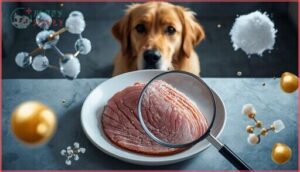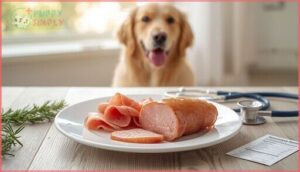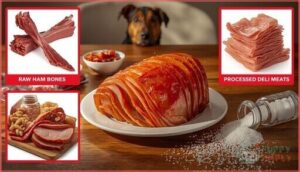This site is supported by our readers. We may earn a commission, at no cost to you, if you purchase through links.
That leftover holiday ham looks tempting to share with your pup, but before you slip them a slice under the table, you should know what veterinarians have to say about it. While cooked ham won’t immediately harm most dogs in tiny amounts, it’s far from an ideal treat for your furry friend.
The culprit isn’t the meat itself—it’s what comes with it. Ham is loaded with sodium and fat, two ingredients that can wreak havoc on your dog’s digestive system and overall health, especially if it becomes a regular indulgence.
Understanding the risks, safe portion sizes, and healthier alternatives can help you make informed decisions about what ends up in your dog’s bowl.
Table Of Contents
- Key Takeaways
- Can Dogs Eat Cooked Ham?
- Health Risks of Feeding Ham to Dogs
- Nutritional Profile of Ham for Dogs
- Safe Ways to Offer Ham to Dogs
- What to Avoid When Feeding Ham
- Healthier Protein Alternatives to Ham
- Warning Signs and When to Contact Your Vet
- Frequently Asked Questions (FAQs)
- Can I give my dog a piece of cooked ham?
- What meat should dogs not eat?
- Is it safe to feed dogs raw ham?
- Are there any health benefits to feeding my dog ham?
- Is there a difference between cooked and uncooked ham for dogs?
- Are there any alternatives to ham that are safe for dogs?
- How much ham can I give my dog safely?
- Can puppies safely eat cooked ham portions?
- Is ham suitable for dogs with allergies?
- How does ham compare to other meats?
- Conclusion
Key Takeaways
- While dogs can technically eat small amounts of plain cooked ham on rare occasions, the high sodium content (often over 350mg per ounce) and saturated fat create serious risks, including salt poisoning, pancreatitis, and long-term organ damage, that make it a poor choice for regular feeding.
- Safe ham portions should never exceed 10% of your dog’s daily calories, must be lean cuts with all visible fat trimmed, cooked plain without seasonings or glaze, and offered only as an occasional high-value training reward rather than a routine treat.
- You should completely avoid ham bones (they splinter and cause choking or internal injuries), processed deli meats with excessive additives, glazed or honey-baked varieties with concentrated sugar, and any ham seasoned with garlic or onion, which are toxic to dogs.
- Healthier protein alternatives like plain cooked chicken, turkey, lean beef, or safe fruits and vegetables provide better nutrition without the dangerous sodium and fat levels, and if your dog shows symptoms like excessive thirst, vomiting, tremors, or abdominal pain after eating ham, contact your vet immediately, as these signal potential salt poisoning or pancreatitis.
Can Dogs Eat Cooked Ham?
You’ve probably wondered whether it’s safe to share a bite of cooked ham with your dog, especially during holiday meals or family gatherings.
While ham isn’t the best choice, you can explore safer alternatives like plain chicken or turkey that won’t upset your pup’s stomach.
The answer isn’t a simple yes or no, because while dogs can technically eat cooked ham, it comes with some important considerations you need to understand first.
Let’s break down what you should know about feeding ham to your furry friend, starting with the basics.
The Short Answer
Yes, dogs can eat cooked ham, but only in very small amounts on rare occasions. While cooked ham isn’t toxic, it’s far from ideal for your dog’s health. The high sodium and fat content pose real Dog Health Risks that responsible pet owners shouldn’t ignore.
Here’s what matters most about can dogs eat ham:
- Direct Replies from vets: Cooked ham should never replace balanced dog nutrition
- Clear Confirmations: Occasional tiny portions won’t harm healthy dogs
- Concise Answers: Skip ham bones entirely—they splinter and cause serious injuries
This Answer Structure gives you the Short Responses you need before diving deeper.
Why Ham Isn’t Ideal for Dogs
Ham nutrition falls short for canine dietetics in several ways. While it offers protein, the salt content in cooked ham can exceed 350 milligrams per ounce, straining your dog’s kidneys and heart.
The high saturated fat disrupts dog nutrition by raising pancreatitis risk, especially in sensitive pups. Unlike balanced meat alternatives, ham lacks complete amino acids essential for pet wellness.
Occasional Small Amounts Vs. Regular Feeding
Given those concerns, you might wonder whether feeding frequency has an impact. It does. Occasional small amounts let your dog’s digestive health handle the sodium spike without overwhelming their system.
While regular feeding compounds caloric intake and nutrient balance issues. Portion control becomes critical—even lean ham adds calories quickly, and without careful dietary restrictions, you risk weight gain and long-term canine nutrition problems that compromise overall dog health.
Health Risks of Feeding Ham to Dogs
While a small bite of cooked ham mightn’t immediately harm your dog, regular feeding can open the door to several serious health concerns. The combination of high sodium, excess fat, and rich ingredients creates a recipe for trouble, especially in dogs with underlying conditions or sensitivities.
Let’s walk through the main risks you should know about before sharing ham with your furry friend.
High Sodium Content and Salt Poisoning
One slice of deli ham can pack hundreds of milligrams of sodium, pushing your dog toward hypernatremia—a condition where blood sodium climbs above safe levels and draws water out of brain cells. Salt overload disrupts electrolyte balance, triggering symptoms that range from excessive thirst and dry gums to tremors, seizures, and even coma if fluid management isn’t prompt.
One slice of deli ham can push your dog toward dangerous salt poisoning, causing tremors, seizures, or even coma
Watch for these warning signs of sodium toxicity:
- Increased thirst and frequent urination as the body tries to dilute high sodium foods
- Vomiting or diarrhea indicating digestive upset from salt content
- Lethargy, confusion, or ataxia as brain cells respond to osmotic shifts
- Tremors or seizures signaling severe hypernatremia requiring immediate veterinary care
- Swelling or rapid changes in behavior, especially in dogs with kidney or heart issues
Dogs are also at risk for severe salt poisoning symptoms if they ingest even moderate amounts of salty meats or table scraps.
Fat Content and Pancreatitis Risk
Fatty treats carry a hidden danger: high fat intake floods your dog’s bloodstream with triglycerides, triggering pancreatic inflammation that can spiral into painful pancreatitis.
Saturated fats in ham raise blood lipid levels and pancreatic stress after meals, especially in overweight dogs or those with sensitive stomachs. Repeated exposure to fatty acid effects compounds the risk, turning an occasional indulgence into a chronic dog health threat.
Digestive Issues and Upset Stomach
Rich or salty foods disrupt your dog’s gastrointestinal system, triggering vomiting or loose stools within hours as digestive enzymes struggle to break down excess fat.
Before offering treats like pig feet, check safe preparation methods for pork-based snacks to avoid digestive upset.
Stomach inflammation from ham’s high sodium and fat content can cause bloating, gas, and abdominal discomfort that compromise gut health.
While occasional digestive upsets usually resolve within 48 hours, repeated exposure to ham risks worsening digestive issues and potential food allergies.
Long-Term Health Complications
Repeated ham consumption compounds risks far beyond a single upset stomach, threatening your dog’s long-term vitality through gradual organ damage and metabolic decline. Regular fatty, salty portions strain multiple body systems simultaneously, creating a cascade of chronic health challenges that may require lifelong veterinary management.
The health risks associated with ham consumption in dogs are numerous and can be severe. Some of the key risks include:
- Pancreatic stress from recurring fat intake raises the likelihood of episodic pancreatitis and chronic inflammation that impairs digestive enzyme production
- Cardiovascular risks intensify as persistent sodium excess elevates blood pressure and worsens fluid retention in dogs with heart or liver disease
- Obesity develops when ham becomes routine, increasing joint load, insulin resistance, and risk for osteoarthritis and shortened lifespan
- Nutrient deficiencies emerge when ham replaces balanced meals, limiting calcium, fiber, and essential vitamins that support bone health and immune function
- Kidney compromise accelerates in older dogs as chronic salt load strains renal filtration and electrolyte balance over months to years
Nutritional Profile of Ham for Dogs
Before you decide whether to share a slice of ham with your dog, it’s worth understanding what’s actually in it. Ham does contain protein and certain nutrients, but the bigger picture involves high levels of fat and sodium that can cause real problems.
Let’s break down the nutritional makeup so you can see why veterinarians generally steer pet owners toward better options.
Protein Content in Ham
Ham does pack a respectable amount of protein, with lean cooked varieties delivering around 20 to 22 grams per 100 grams. That’s a decent protein density, and it offers all nine essential amino acids your dog needs for muscle repair and enzyme production.
However, protein bioavailability alone doesn’t make ham a balanced choice for canine dietary needs, especially when you consider what else comes with it. It’s also important to be aware of ham’s notable sodium content, which can impact your dog’s health if consumed in excess.
Fat and Sodium Levels
Beyond protein content, ham nutrition reveals two major concerns for your dog’s diet: fat and sodium. A single ounce can deliver 2 to 8 grams of fat depending on the cut, and sodium intake spikes quickly, with typical slices containing 200 to 400 milligrams.
That high fat content and salt content don’t fit balanced meals, especially for dogs prone to pancreatitis or heart issues.
Vitamins and Minerals Present
While ham does offer some nutritional value through B vitamins like thiamine and B12 that support energy and nerve function, plus minerals like iron and zinc, it’s not a reliable source for meeting your dog’s dietary needs.
Here’s what you’ll find in a typical serving:
- Small amounts of vitamin A for vision and immune support
- B vitamins supporting cellular energy and red blood cell formation
- Trace minerals including iron, zinc, and phosphorus for bones and immunity
The catch? Cooking methods and processing affect nutrient absorption, and the fat content and sodium far outweigh these modest benefits for canine nutrition.
Why Ham Isn’t a Balanced Option
Despite those trace vitamins and minerals, ham falls short as a balanced protein source for canine nutrition. It lacks the fiber your dog needs for digestive health and can’t match the nutrient profile of complete dog foods formulated to meet canine dietary needs.
Regular feeding crowds out balanced diets, potentially leading to nutrient deficiency while raising questions many pet owners ask: can dogs eat ham safely long-term?
Safe Ways to Offer Ham to Dogs
If you’ve decided to give your dog a small taste of ham, there are a few important steps you can take to minimize the risks we’ve discussed. The key is being selective about the type of ham you choose, how you prepare it, and how much you actually offer.
Let’s walk through the safest approach to sharing this treat with your furry friend.
Choosing Lean, Low-Sodium Cuts
If you decide to offer your dog a small taste of cooked ham, opt for the leanest cuts available with minimal visible fat. Lean meat options like trimmed pork tenderloin contain substantially less fat than regular ham, reducing strain on your pup’s pancreas.
Always check labels for sodium content, choosing low-sodium cuts with under 140 milligrams per serving to protect your dog’s heart and kidneys.
Proper Cooking and Preparation
Once you’ve selected a lean cut, proper cooking and preparation matter just as much for dog food safety. Follow these essential steps when feeding ham to dogs:
- Cook to 165°F internal temperature using a meat thermometer to kill harmful bacteria
- Trim all visible fat and skin before serving to minimize fat load
- Serve plain without seasonings, salt, or glaze to protect your dog’s health
Always let cooked ham cool briefly before cutting it into small, bite-sized pieces.
Appropriate Portion Sizes
Even when ham is cooked properly, portion control remains essential for dog food safety and canine digestive health. Aim for no more than 10% of your dog’s daily caloric intake to prevent dietary risks while maintaining nutrient balance.
| Dog Weight | Maximum Ham Portion | Frequency |
|---|---|---|
| 10–20 lbs | 1–2 small cubes | Rare treat only |
| 20–50 lbs | 2–4 small cubes | Rare treat only |
| 50–80 lbs | 4–6 small cubes | Rare treat only |
| 80+ lbs | 6–8 small cubes | Rare treat only |
| Puppies | Avoid entirely | Not recommended |
Think of cooked ham as an occasional high-value reward during training sessions, not part of daily feeding or regular meal planning.
Avoiding Seasonings and Additives
When selecting ham for your dog, plain cooked meat with no added salt or curing agents minimizes sodium exposure and protects against toxic ingredients.
Avoid processed varieties containing nitrates, nitrites, or flavor enhancers like MSG, which compromise additive-free safety.
Skip glazed or seasoned options entirely, as these often hide preservatives and excessive sodium that natural preservatives don’t replace in safer protein choices.
What to Avoid When Feeding Ham
Even if you’ve decided to give your dog a small piece of cooked ham as an occasional treat, there are certain types and preparations you should steer clear of entirely.
Some versions of ham pose serious safety risks, from physical hazards like bones to toxic ingredients that can harm your furry friend. Here’s what to avoid when offering ham to your dog.
Ham Bones and Choking Hazards
Ham bones might seem like a natural treat, but they’re one of the most dangerous parts you can offer your dog.
Bone fragmentation happens easily with cooked bones, creating sharp pieces that pose serious choking risks and airway obstruction. These fragments can cause gastrointestinal injury, puncturing the esophagus or intestines, leading to digestive trauma that often requires emergency surgery to resolve.
Processed and Deli Hams
Deli counters and prepackaged sliced meats come loaded with hazards that make them unsuitable for your dog’s diet.
Meat preservation techniques used in commercial ham production rely on curing methods that spike sodium dangerously high, often exceeding 400 milligrams per ounce, while additives like nitrites and phosphates add chemical burden your pet doesn’t need, creating serious concerns for dog nutrition and health beyond simple feeding ham to dogs as an occasional treat.
Honey Baked and Glazed Varieties
Honey Baked and Glazed Varieties aren’t just unhealthy, they’re a trifecta of risks of feeding ham to dogs you need to avoid entirely.
The glaze ingredients pack concentrated sugar and sodium that compound cooked ham’s existing dangers, while honey content raises blood sugar unnaturally fast, turning baked ham nutrition into a digestive nightmare.
Glazed ham safety simply doesn’t exist for your dog, even when Can Dogs Eat Ham seems like a simple question about dog nutrition and health or food allergies in dogs.
Hams With Garlic or Onion Seasoning
Garlic toxicity and onion allergies pose serious seasoning risks that make flavored hams completely off-limits for your dog.
Both contain toxic substances called thiosulfates that damage red blood cells, triggering digestive issues, weakness, and potentially life-threatening anemia.
Even small amounts compromise canine health and food safety, so skip seasoned varieties entirely and explore ham alternatives that protect your furry friend from food toxicity and food allergies in dogs.
Healthier Protein Alternatives to Ham
If you’re looking for safer ways to reward your dog with protein, you have plenty of better options than ham. Lean meats, certain fruits and vegetables, and quality commercial treats can all provide nutrition without the excessive salt and fat that make ham risky.
Here are some veterinarian-approved alternatives that offer protein and flavor while keeping your furry friend healthy.
Plain Cooked Chicken or Turkey
When you’re looking for healthier treats to reward your furry friend during dog training, plain cooked chicken or turkey stands out as one of the safest lean meats available. These protein sources offer excellent poultry nutrition without the risks that come with processed options, making them vet-approved choices for your canine diet.
- Chicken breast delivers about 26 grams of protein per 3 ounces, supporting muscle health while keeping fat low for pet safety
- Turkey contains roughly 25 grams of complete protein with all nine essential amino acids your dog needs for ideal dog health
- Both options stay under 140 calories per serving when you remove the skin, helping prevent weight gain and digestive issues
- Cook to 165°F and serve plain—no salt, garlic, or seasonings—to avoid food toxicity while providing healthy treats
Always follow veterinary advice by limiting treats to 10% of daily calories, cutting meat into bite-sized pieces appropriate for your dog’s size, and monitoring for any allergic reactions when introducing new protein sources into their routine.
Lean Beef in Moderation
Beyond poultry, lean cuts of beef offer another protein-rich alternative that aids canine digestion when you feed it in moderation. Beef nutrition delivers iron, zinc, and B vitamins that promote dog health, but portion control matters for pet safety. Choose extra-lean options with less than 10 percent fat, cook thoroughly without seasonings, and rotate protein sources within balanced diets to promote food safety and ideal well-being.
| Lean Beef Benefit | Nutritional Value | Feeding Guideline |
|---|---|---|
| Complete Protein | All 9 essential amino acids | Limit to 10% of daily calories |
| Iron & Zinc | Supports red blood cells | Remove visible fat before serving |
| B Vitamins | Boosts energy metabolism | Cook plain without garlic or salt |
Following veterinary advice, trim excess fat and serve small portions to avoid digestive upset while providing variety in your dog’s diet.
Safe Fruits and Vegetables as Treats
While lean proteins support your dog’s needs, fresh fruit options and veggie snack ideas offer nutritious dog rewards without ham’s risks.
Carrot sticks, apple slices minus seeds, and blueberries provide healthy treat alternatives rich in vitamins and fiber.
Cucumbers, green beans, and steamed broccoli florets serve as wholesome canine snacks that promote pet health and animal wellness through smart pet nutrition choices.
Commercial Dog Treats
If you prefer the convenience of ready-made options, commercial dog treats formulated specifically for canine diet and nutrition offer balanced pet food safety without guesswork.
Look for products with:
- Meat listed as the primary treat ingredient, ensuring quality dog nutrition
- Minimal fillers or sweeteners that compromise pet health
- Clear labeling of protein, fat, and calorie content per serving
These healthy snacks support your dog’s overall canine diet while keeping portions controlled.
Warning Signs and When to Contact Your Vet
Even a small amount of ham can sometimes trigger a serious reaction in your dog, so it’s important to know what warning signs to watch for. Recognizing symptoms early can make all the difference in preventing complications and getting your pet the care they need.
Here’s what to look out for and when you should reach out to your veterinarian.
Symptoms of Salt Poisoning
If your dog consumed too much salty ham, watch for these hypernatremia symptoms. Excessive thirst appears within hours of high salt intake risks, followed by frequent urination and restlessness. Neurological toxicity signs include confusion, disorientation, muscle tremors, or even seizures when sodium poisoning disrupts brain function.
Digestive issues like vomiting, diarrhea, and drooling often accompany the dehydration effects of salt poisoning, signaling your dog needs immediate veterinary attention.
| Early Warning Signs | Neurological Symptoms | Critical Red Flags |
|---|---|---|
| Excessive thirst and drinking | Confusion or disorientation | Seizures or convulsions |
| Frequent urination | Muscle tremors or twitching | Unsteady gait or collapse |
| Restlessness or irritability | Head tilting | Lethargy progressing to coma |
| Dry mucous membranes | Weakness | Rapid heart rate with weak pulse |
Signs of Pancreatitis
Recognizing pancreatitis early can save your dog’s life. Abdominal pain in the upper belly, hunched posture, and reluctance to move signal inflammation. Vomiting symptoms often appear alongside loss of appetite and lethargy.
You might notice fever response, rapid breathing, or tender abdomen during gentle palpation. Digestive issues worsen after fatty meals like ham. Contact your veterinarian immediately for pancreatitis diagnosis through blood work and imaging.
Vomiting, Diarrhea, and Digestive Distress
Upset stomachs strike quickly when your furry friend overindulges in ham. Gastrointestinal issues like vomiting and diarrhea indicate the GI tract is irritated, often triggering gastroenteritis that disrupts digestive health.
Watch for these digestive issues:
- Repeated vomiting within hours of eating ham
- Loose or watery stools persisting beyond 24 hours
- Abdominal discomfort with whining or restlessness
- Dehydration signs like dry gums or sunken eyes
Following canine nutrition guidelines and veterinary advice protects your pet’s wellbeing with proper pet care tips.
When Immediate Veterinary Care is Needed
Rush your dog to the emergency vet if you notice severe bleeding, seizures, or signs of poison control needs like tremors after ham consumption.
Urgent care becomes critical when the GI tract shows distress through bloody vomiting, when breathing becomes labored, or if salt poisoning symptoms like confusion or collapse appear.
Trauma response and seizure management require immediate veterinary care for dogs.
Frequently Asked Questions (FAQs)
Can I give my dog a piece of cooked ham?
Yes, you can offer a small piece of plain cooked ham occasionally, but it’s not recommended as a regular treat due to high sodium and fat content that may harm your dog’s health.
What meat should dogs not eat?
While most meat is safe, toxic meats like raw pork, processed deli meats, and seasoned proteins can trigger meat allergies, food toxicity in animals, and dog food poisoning in our furry friends.
Is it safe to feed dogs raw ham?
No, raw ham carries bacterial contamination risks like Salmonella and Listeria that threaten canine nutrition facts and pet food safety, making raw feeding dangerous despite some raw meat dangers being overstated in discussions of food allergies.
Are there any health benefits to feeding my dog ham?
While ham offers protein and B vitamins, the nutritional value doesn’t justify the risks for canine health.
Better protein sources provide complete pet diet benefits without excessive sodium threatening dog wellness or digestive safety.
Is there a difference between cooked and uncooked ham for dogs?
Absolutely. Cooking Methods matter in terms of Ham Safety and dog dietary safety.
Cooked ham eliminates bacterial risks like Salmonella, while Raw Ham Risks include dangerous pathogens that cause severe digestive issues in your furry friend.
Are there any alternatives to ham that are safe for dogs?
Yes, several lean proteins make excellent healthy alternatives for dog treats. Plain cooked chicken, turkey, or white fish like cod offer high-quality nutrition without ham’s excessive salt and fat content.
How much ham can I give my dog safely?
For most dogs, a single small bite-sized portion is the safe feeding limit.
Medium dogs should receive no more than a fraction of a cup, while small dogs need even less to avoid ham toxicity levels.
Can puppies safely eat cooked ham portions?
A tiny morsel of plain cooked ham won’t immediately poison your puppy, but the high sodium and fat content make it risky for developing digestion, threatening pancreatitis, salt poisoning, and digestive upset in growing dogs.
Is ham suitable for dogs with allergies?
Ham isn’t recommended for dogs with food allergies, as pork proteins and additives may trigger food sensitivities or protein intolerance.
Hypoallergenic diets with novel proteins better support canine nutrition and prevent allergy reactions in sensitive pets.
How does ham compare to other meats?
Compared to chicken or turkey, cooked ham delivers similar protein content but packs markedly higher sodium levels and fat content, making leaner meat alternatives nutritionally better choices for your dog’s overall health and digestive wellness.
Conclusion
Think of your dog’s diet like a savings account—small, risky deposits add up faster than you’d expect. While the occasional tiny piece of cooked ham won’t empty the account, consistent treats can drain your pup’s health reserves through sodium overload and pancreatitis risk.
When you’re tempted to share, remember that better options exist. Your dog trusts you to make choices that protect their long-term wellbeing, not just satisfy momentary tail wags.
- https://www.foodsafetynews.com/2025/09/pet-food-dangers-how-contaminated-raw-diets-and-kibble-threaten-human-health
- https://pmc.ncbi.nlm.nih.gov/articles/PMC1140397
- https://www.mayoclinic.org/diseases-conditions/trichinosis/symptoms-causes/syc-20378583
- https://animalarkanimalhospital.com/blog/can-dogs-eat-ham
- https://centralbrowardvet.com/blog/can-dogs-eat-ham
















